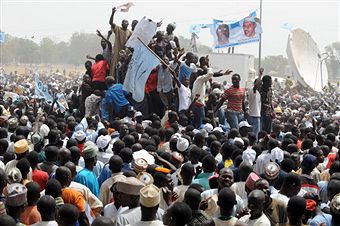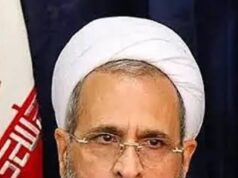 In the name of politics, people act in ways that raise the question “what principles motivate their actions?’ Then, of course, there is a not-too-strange-for-our-clime reaction: “in politics who needs principles?” For which a reasonable response is available: human beings do; otherwise we are no different than brutes.
In the name of politics, people act in ways that raise the question “what principles motivate their actions?’ Then, of course, there is a not-too-strange-for-our-clime reaction: “in politics who needs principles?” For which a reasonable response is available: human beings do; otherwise we are no different than brutes.What is depressing is that the majority refuses to ask questions and we are all still prisoners of primordial attachments and sectarian affiliations. Break loose and secure a semblance of the freedom of the mind, which in the end is the most prized object of our humanity, and you become a suspect subject to mental evaluation. Political correctness runs amok and the irrational loyalty of tribal jingoists and religious bigots are ever present distractions of readers’ comments on many topical stories on the websites of our media outlets.
A case in point: Question the propriety of invading states with the intimidating force of the military and the aggravating scenario of having them masked and you are immediately underwhelmed with a variety of responses, not a few justifying the practice on nothing but an unsound recourse to “my side is always right and the other side is never right.” And when the Chairman of INEC himself came up against the practice, was there a rethink on the part of those folks who saw nothing wrong with the practice? No. It makes the stomach turn.
The need for principles in our politics cannot be overstated because just like vision, without principles, the people and the nation perish. And there is a difference between principled approach to politics and its tactical counterpart, though it is easy to confuse them. Almost all voluntary actions are aimed at achieving one goal or another and tactic is the chosen path or method of getting there. Needless to say, if the goal is devilish, nothing can make the tactic or method angelic. Just as a good end does not justify an evil means so a good means does not justify an evil end. And much of what we have in our politics is the combination of evil means and evil ends.
We need a constant reminder that the ultimate end, the fundamental assumption, the principle of politics, especially democratic politics, is the good of the people. When monarchs fight over territories, they play politics, but not necessarily for the good of the people. Our advancement from monarchical rule in favor of the republican ideal is an indication of our belief that the people’s interests are the sole justification of whatever we do and their voices are pivotal to the recognition and promotion of their interests. We err irredeemably if we act as if we know more than the people what those interests are and how they ought to be promoted.
Elections are the means or method by which the people not only register their interests but also choose how they will have them promoted and through whose instrumentality they will have them satisfied. Let us concede that even in matters so fundamental and so intimately connected to the people, they can be mistaken in their judgment about how or by whom. But that is their prerogative: to be mistaken. We cannot therefore justify the imposition of our will on them by appeal to the possibility, even probability, of mistakes on their part.
By and large, elections are the means by which the will of the people is frustrated, violated and undermined. And much as it may have been cast in that light, this is not just an inter-party issue, it is also an intra-party phenomenon. Witness the demand for internal democracy within political parties. With elections, tactics trump principles for a good number of our political players, and because it has happened very often, even otherwise decent and morally conscious people take it as the norm. Coming in a variety of forms and shapes, it is anything but normal.
With the fierceness of our electoral competitions, where the stakes are high, political tactics come into their full focus. While principles underpinning elections are about fundamental ideals of government by consent of the governed, tactics are the means of brightening the electoral chances of particular candidates. These may include such mundane ones like securing the support of political heavyweights or, in the case of a party, fielding popular candidates. These appear innocuous though the devil is in the detail.
There are far more insidious tactics, including the use of de facto political power to intimidate opponents (with troops and police), the use of state funds to buy voters and starve opponents of access to funds, and most objectionably, the politicisation of ethnic and religious sentiments to divide the people with the sole objective of manipulating the electorate and having an edge.
This has gone on for far too long with impunity. Many would maintain that the political parties are equal opportunity offenders, but the most daring culprit has always been a party that controls the centre. We don’t have to quibble over this because the evidence is copious from the beginning of the republic. Unfortunately it is getting worse and it is time that reasonable stakeholders, people of goodwill, think seriously about the harm it does to the psyche of the electorate and our long term interest in the deepening of democracy.
The effectiveness of such odious tactics has always been an issue but it depends on the integrity of citizens and how much they understand the evil that the actions of the politicians do to the system. If they have a good understanding, it also depends further on how much they personalise the actions as an insult to their dignity, itself a factor of education and wellbeing.
In 2011, Candidate Jonathan rode high on the goodwill of the electorate who saw in him a fresh start with a transformation agenda. They also saw him as a victim of a gang-up by a section of the political class. But the honeymoon didn’t last before the realities of federal ineptitude stared citizens in the face. Increased insecurity, increased mass poverty, increased corruption and the regionalisation and spiritualisation of disenchantment have marred the transformation agenda of the president. In the face of these developments, the ruling party has effectively severed the relationship between politics and principles in favour of crude political tactics. Included here are such tactics as the recourse to the politicisation of religion, the manipulation of ethnic sentiments and the deployment of security agents for partisan advantage. So much for transformation!
The few examples I cited are not unknown to readers. But someone would object that having observed that all political parties are implicated, I chose to scapegoat the ruling party. It is no scapegoating and there is a good reason for taking my samples from the practice of the ruling party. The PDP has ruled the country since the return of civil rule. Since 1999, states and governors have been at the mercy of the centre. The various agencies of government, including the EFCC, Police, Military, etc, have acted under the direction of the President, the leader of the ruling party, or his designee. A truly transformational agenda would have nipped the repulsive practices in the bud. Instead, the proverbial witch has only continued to breed more offspring.
I have alluded to the common belief that the parties aren’t different and there may be some truth to it. But at the inception of the political parties in 1998, what was true and still is to some extent was that PDP was the party of the military, peopled by characters with no moral scruple about politics and people. They didn’t care about the evil that was visited on the nation post-June 12, 1993; they were into militarised politics and they had a shareholder mentality about politics, including a cut-throat competition for power for material benefits, with no enduring agenda for the common people. Fifteen years later, this leopard has not changed its skin a bit.
I have alluded to the common belief that the parties aren’t different and there may be some truth to it. But at the inception of the political parties in 1998, what was true and still is to some extent was that PDP was the party of the military, peopled by characters with no moral scruple about politics and people. They didn’t care about the evil that was visited on the nation post-June 12, 1993; they were into militarised politics and they had a shareholder mentality about politics, including a cut-throat competition for power for material benefits, with no enduring agenda for the common people. Fifteen years later, this leopard has not changed its skin a bit.
I grieve internally for some of the genuinely decent and humane persons now taking a decision of a lifetime to associate with this group of devourers.
[myad]






